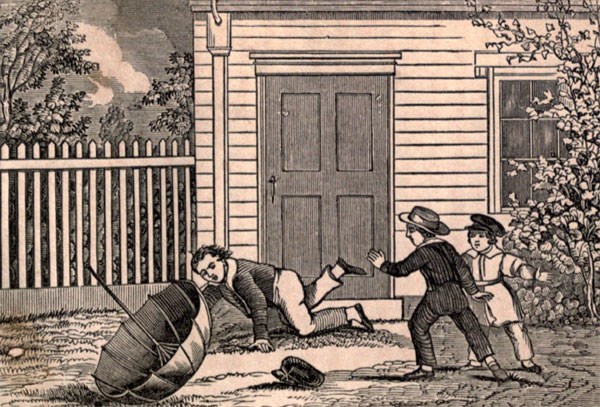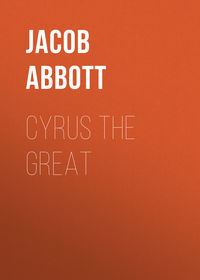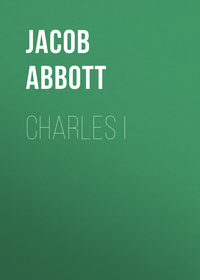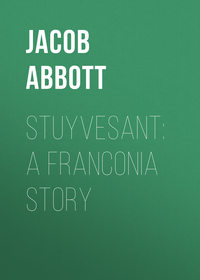![Rollo's Philosophy. [Air]](/covers_330/36364270.jpg)
Rollo's Philosophy. [Air]
"And water is expanded in a soap bubble," said Rollo.
"Yes," replied his father, "and there is a great deal of air included in it, which all has to be brought down when the bubble itself descends. And thus, you see, the bubble must descend slowly. Water is expanded, too, in clouds; for, in that case, it is divided into millions of small particles, by which it is spread out over a great deal of air, and cannot descend without bringing a large portion of the air with it. Men have contrived, on this principle, to make an apparatus to prevent being hurt by falling from great heights."
"What is it?" said Rollo.
"Why, it is called a parachute. It is a sort of umbrella; in fact, it is an umbrella, only made very large. It is folded up, and fastened under a balloon, just over the car, which the man is in. Then, if the balloon bursts, or any other accident happens to it, and the man begins to fall, the parachute opens and spreads, and then the man falls very slowly. The reason is, that the parachute takes hold of a large mass of air, and brings it down with it; and so it cannot descend very fast."
A few days after this, Nathan said to Rollo, as they were playing in the yard, that he wished that he had a parachute.
"I know where there is one," said Rollo.
"A parachute," said Nathan; "a real parachute?"
"Yes," said Rollo, "or, what is the same thing, a great umbrella."
"Is that just the same?" said Nathan.
"Yes," said Rollo; "for father said that a parachute was in fact only a large umbrella; and father has got a large umbrella in the closet, and I have a great mind to go and get it for a parachute."
"But you haven't got any balloon," said Nathan.
"O, no matter for that," said Rollo.
"Then how are you going to get up into the air?" asked Nathan.
"Why, I can climb up on the shed, and jump off that, and hold the umbrella over my head."
Just at this moment, Rollo's cousin James came into the yard, and Rollo ran to him, to explain to him about the parachute. After describing to him the construction of it, and its use by men who go up in balloons, he said he was going to get his father's umbrella, which would make an excellent parachute.
"And then," continued he, "I am going to get upon some high place, and jump off, and hold the parachute over my head, and then I shall come down as light as a feather."
"O Rollo," said James, "I don't believe you will."
"Yes I shall," said Rollo: "you see the parachute is expanded, and so brings down a great deal of air with it, and this makes it come very slowly. Air is a real thing, James, and it keeps the parachute back a great deal."

"James and Nathan both ran towards him, thinking that he must be hurt."—Page 37.
So Rollo ran off after the umbrella, very much interested in proving to James, by actual experiment, that the air was a real thing. When he came with it, he was himself inclined to make the first experiment from the low side of the shed. He could climb up, by means of a fence at the corner. James advised him, however, to try it first from the end of a woodpile, which was pretty high, but yet not so high as the shed. James was not quite sure that the experiment would succeed, and he was afraid that Rollo might get hurt.
Rollo said that he was not afraid to jump off the shed. He knew the parachute would bear him up. He did not believe but that he could jump off the house with it; and, at any rate, he could jump off the shed, he knew. He accordingly clambered up, and, taking his station upon the eaves, he spread the umbrella over his head, and then jumped off.
Down he came with great violence; his cap flew off in one direction, and his umbrella rolled away in another, as he had to put out both his hands, to save himself, when he reached the ground. As it was, he came down upon all fours, and in such a way, that James and Nathan both ran towards him, thinking that he must be hurt.
"Did you hurt yourself, Rollo?" said James.
"No," said Rollo, "not much."
"I don't think the umbrella did you much good."
"No," said Rollo, as he got up rubbing his elbows, "it didn't, and I don't see what the reason is."
"You came down just as hard as you would without it."
"Yes," said Nathan, "and he almost broke his back; I don't believe the air is any real thing at all."
The fact was, that the umbrella did do some good. Rollo did not come down quite so hard as he would have done without it. It retarded his descent a little. But it was not large enough to enable him to descend in safety. When his father said that a parachute was in fact only a large umbrella, he meant a great deal larger than Rollo had supposed. A parachute, such as is used with balloons, is a great deal larger than any umbrella that ever was made.
QUESTIONS
What was Nathan's wish, after he had read his father something out of his book? Did he think that he could fly if he had wings? Did his father think so? What deficiency did his father think was even more important than that of wings? Did Nathan think that a boy was stronger than a bird? Is a boy absolutely stronger than a bird? Is he relatively stronger? What is the meaning of relatively stronger? Would a man be strong enough to work wings that were sufficiently large to bear him up into the air? Would there be any great difficulty in constructing wings for him if he were strong enough?
Is any visible substance lighter than air? What would be the consequence if any of the loose substances about the earth's surface were light enough? What are clouds composed of? What difficulty did Rollo's father point out, in regard to their floating in the air? What is a parachute? Describe Rollo's experiment with the umbrella.
CHAPTER III.
VALVE MAKING
One morning, when Rollo awaked, he heard a sharp clicking against the window.
"Nathan," said he, "Nathan, I believe there is a snow-storm."
But Nathan was too sleepy to hear or understand.
Rollo looked up, but there was a curtain against the window, and he could not see very well. He listened. He heard a low, moaning sound made by the wind, and a continuance of the sharp clicking which he had heard at first.
When he had got up, and dressed himself, he found that there was a violent snow-storm. At first he was glad of it, for he liked snow-storms. But then, pretty soon, he was sorry, for it had been winter a long time, and he was impatient for the spring.
After breakfast, he and Nathan read and studied for two hours, under their mother's direction. When they were released from these duties, Rollo proposed to Nathan that they should go out into the shed, and see how the storm came on. There was a large door in the shed, opening towards the street, where they could stand, protected from the wind, and see the drifts of snow.
They accordingly put on their caps, and went. They found that the snow was pretty deep. It was heaped up upon the fence and against the windows; and there was a curious-shaped drift, with the top curled over in a singular manner, running along from the corner of the shed towards the garden gate.
"Ah," says Rollo, "when it clears up, I mean to go and wade through it."
"And I too," said Nathan.
"O Nathan," said Rollo, "it is over your head."
"Hark!" said Nathan; "who is that pounding in the barn?"
"It is Jonas, I suppose," said Rollo. "I mean to go out and see what he is doing."
"How are you going to get there?" said Nathan.
"O, I can put on my boots," said Rollo, "and go right out through the snow."
"I wish I could go," said Nathan.
"Well," said Rollo, "I can carry you on my back."
Nathan clapped his hands at this proposal, being doubly pleased at the prospect of both getting into the barn to see what Jonas was doing, and also of having a ride, on the way.
So Rollo put on his boots, while Nathan went and got Rollo his straps, to fasten his pantaloons around them. When all was ready, Rollo sat down upon the step of the door, in order that Nathan might get on easily.
"We'll play that I am a camel," said Rollo, "and that I'm kneeling down for you to get on."
"Do camels kneel down," said Nathan, "when the men want to ride?"
"Yes," said Rollo; and so saying, he rose laboriously, with his heavy burden upon his shoulders. He staggered along with some difficulty, but yet safely, until he came to the great drift; and, after wallowing into the midst of it, he lost his balance, and both camel and driver rolled over together into the snow. The snow got up under Nathan's sleeve, and he began to cry.
"O Nathan," said Rollo, "don't cry. I'll run and get Jonas to come and carry you in."
So Rollo ran into the barn, and called to Jonas to come quick. Jonas laid down his hammer upon the bench, and followed Rollo. He found Nathan in the snow, and took him up in his arms, and carried him into the barn.
As soon as he got him under cover, he brushed the snow off, and told him not to cry. "I've got a fire in the shop," said he, "and you shall see me do my work. I'm mending the bellows."
So he led Nathan through the barn, and thence along under a shed to a sort of shop-room, where there was a large fireplace and a fire. Rollo put on some sticks, which made a great blaze; and so Nathan soon got warm and dry, and forgot all his troubles. Then Jonas sat him up, upon a high stool, near the bench, where he could see him work. He was just drawing out some of the nails, by which the leather of the bellows was nailed to the sides.
"What is the matter with the bellows?" said Nathan.
"The valve is out of order," replied Jonas.
"The valve," repeated Nathan; "what is the valve?"
"The valve is a kind of clapper," said Jonas. "I will show it to you in a few minutes."
So Jonas proceeded to take off the leather from one of the sides of the bellows. There was a hole in one of the sides, but no hole in the other. Nathan had often noticed the hole, but he did not know what it was for.
"What is the hole for?" said Nathan.
"That is to let the air in," said Jonas.
"What do they want the air to come in for?" said Nathan.
"To make wind of," said Jonas.
"Do they make wind out of air?" said Nathan.
"Yes," said Jonas, "they get the bellows full of air, and then blow it out through the nose, and that makes wind."
"Wind is air, put in motion," said Rollo. "I read it in a book."
By this time, Jonas had taken off the leather so far that Nathan could see into the bellows. He saw that there was a little clapper over the hole, in one of the sides of the bellows.
"Is that the valve?" said he to Jonas.
"Yes," said Jonas.
"What is it for?" said Nathan.
"It is to keep the wind from coming out of that hole."
"Why don't they want the wind to go out of that hole?" said Nathan.
"Because," said Jonas, "they want it to go to the fire,—to blow the fire."
"You see," said Rollo, "it can't go out of the hole, and so it has to go out of the long nose, which is pointed towards the fire."
"What makes it go out at all?" said Nathan.
"Why, when we blow the bellows, we press the two sides together, and that presses the wind out. It can't go out of the hole whence it came in, because the clapper stops it up, and so it goes out the long nose, right into the fire, and makes the fire burn."
By this time, Jonas had got the leather off so far, that he could get at the clapper to mend it. He told the boys that it was old and worn out, and he must make a new one.
"How are you going to make it?" said Rollo.
"You'll see," said Jonas, "if you watch me closely."
So Jonas took some leather, and cut out a piece, of an oblong shape, a little wider than the hole, and about twice as long. Then he laid this down over the hole. It covered it entirely. Then he took some small carpet nails, and nailed one of the ends of the leather down to the board. Then Jonas put his hand down under the board, and run one of his fingers up through the hole, and pushed the leather up a little way.
"There," said he to the boys, "you see I have nailed the leather, so that, when it lies down in its place, it covers the hole completely; and yet I can push it up a little with my fingers, so that there will be an opening."
Then Jonas cut a small leather strap, and nailed one end of it down upon one side of the clapper, and the other end upon the other side of the clapper. He put one little carpet nail into each end of the strap. The strap, when it was nailed, passed directly across the clapper or valve. It was not drawn tight across, but it lay upon the clapper loosely. The ends were nailed tight, but the middle rested loosely upon the clapper.
"Now," said Jonas, "I can push the clapper up a little way, but I can't push it far. The strap keeps it from coming up far."
"But why," said Nathan, "do you want it to go up at all?"
"To let the air in," said Jonas. "When I get the leather all nailed on again, I'll show you the whole operation of it."
"And you can be telling us about it in the mean time," said Rollo.
"Well, then," said Jonas, "when I lift up the upper side of the bellows by the handle, to blow, the air comes in by the hole. The clapper lifts up a little way, and lets it in. Then, when I press down the handle again, it presses the air out through the nose, because it can't go back through the valve hole."
"Why not?" said Nathan.
"Because," said Jonas, "the valve falls down over the hole, and stops it up. It is made so as to lift up easily, and then to fall down and cover the hole exactly, and prevent the air going out the same way it came in. So, as it cannot get out by the valve, it has all to go out through the nose. If the nose were stopped up, it could not get out at all."
"And what then?" said Rollo.
"Why, then," replied Jonas, "you could not bring the two sides of the bellows together again. The air between would keep them apart."
"I should like to try," said Rollo.
"Well," said Jonas; "and there are some other experiments you may perform with it too."
At length, Jonas said that he had got the leather all nailed on, and they might try the experiment. He took hold of the nose of the bellows, and held his thumb near the end of it, ready to stop up the hole.
"Now, Nathan, you may take hold of the handles, and pull them apart as if you were going to blow."
Nathan did so. He pulled the handles apart, and held them open.
"Now," said Jonas, "I will stop up the nose, and the valve will close itself; and then you will find that you cannot bring the sides together again."
So Jonas put his thumb over the hole, and told Nathan to blow.
Nathan pressed hard, and the sides came together again, about as easily as usual.
"What!" exclaimed Jonas with surprise. He did not know what to make of the failure of his experiment.
"There must be a leak somewhere," said he. And he took the bellows out of Nathan's hand to look for it.
He found there was a corner, on the side opposite to the one where he had been working, where the leather was open, he having forgotten to nail it down.
"Ah!" said he, "here is the difficulty. When I have nailed this down, we will try again."
"Is that a leak?" said Nathan.
"Yes," said Jonas. "When you worked the bellows, you pressed the air all out through there. I did not know that that was open. Let me nail this down, and then we will begin our experiment regularly."
QUESTIONS
What was Jonas doing in the shop, when Rollo and Nathan went out to find him? What part of the bellows was out of order? How did he make a new valve? How did he fasten it to its place? Did he nail down only one edge, or both edges? Why did he want the other edge to be left at liberty? How did he prevent its lifting up too far? What was the first experiment which he performed with the bellows, after he had finished the mending? Did it succeed at first? Why not? In working a pair of bellows, where does the air come in? Where does it go out? Why cannot the air escape through the valve where it comes in?
CHAPTER IV.
EXPERIMENTS
When Jonas had finished nailing down the corner, he said, "Now there are several experiments, which we can perform with the bellows. I will be the professor, and you two shall be my class in philosophy, and I will direct you how to make the experiments.
"First," said Jonas, "you, Rollo, may take hold of the nose of the bellows with your hand, in such a way as to put your thumb over the end of it, to stop it up, and then let Nathan try to blow."
Rollo did so, and Nathan tried to blow. He found that he could open the bellows very easily; but when he attempted to press the sides together again, he could not. He crowded the handle belonging to the upper side down, as hard as he could, but it would not move.
"What makes it do so?" said Nathan.
"The air inside," said Jonas. "We have stopped up all the places, where it could get out. The valve stops itself. Rollo stops the nose with his thumb, and I have nailed the leather down close, about all the sides. And so the air can't get out, and that keeps you from bringing the sides together again."
Nathan tried again with all his strength. The sides came together very slowly.
"They're coming," said he.
"Yes," said Jonas. "They come a little, just as fast as the air can leak out through the little leaks all around."
"I thought you stopped all the leaks," said Nathan.
"Yes," replied Jonas, "I stopped all the real leaks, but still I can't make it perfectly tight. Some air can escape between the leather and the nails all around, and just as fast as it can get out, so fast you can press the sides together, and no faster."
Here Nathan tried again with all his strength; but he could only bring the sides together very slowly.
"Now comes the second experiment," said Jonas. "While Nathan is trying to press the two handles together, you, Rollo, may run your finger into the hole, and push up the valve a little."
Rollo did so. He pushed up the valve a little with his finger, and that allowed the air to escape through the opening. The consequence was, that the bellows collapsed at once under the pressure which Nathan was exerting upon them.
"There," said Jonas, "you see that when the air is kept in, you cannot bring the sides together; but when I let the air out, then they come together easily."
"Yes," said Nathan; "do it again, Rollo."
So they performed the experiment again. Nathan pulled the handles apart wide, while Rollo kept his thumb over the nose, to keep the air from issuing through. Then Nathan tried to press them together; but he could not, until Rollo put his finger under, and pushed up the valve a little, and then they came together again very easily.
"The air is a real thing, I verily believe," said Nathan.
"Yes," said Rollo, "I know it is. And now for the third experiment, Jonas."
"The third experiment," said Jonas, "is this. Turn the bellows bottom upwards, and try to blow."
Nathan did so. He found that he could work the bellows easily—too easily, in fact; but they did not blow.
"Hold your hand opposite the nose, and see if any wind comes," said Jonas.
They did so; there was no wind, or rather scarcely any.
"The reason is," said Jonas, "that, when the bellows are bottom upwards, the valve hangs down off from the hole all the time, and lets the air all out through the hole in the side; and it can come out more easily there than through the nose, and so it don't blow well."
"Well, Jonas," said Rollo, "that's a pretty good experiment; but what is the next? Let me try the next. Nathan, it is my turn."
"The next experiment, which is the fifth,–"
"No, the fourth," said Nathan.
"The fourth, then," said Jonas, "is to prove what I said to you—that the air, which is blown out at the nose of the bellows, really comes in through the valve. Let me see,—I want something to make a smoke."
"Will not paper do?" said Rollo.
"Yes," said Jonas, "here is some brown paper, which will do." So Jonas rolled it up, and told Rollo to set it on fire, and then, when it was well burning, to step on it with his foot, and put the flame out.
Rollo did so, and the paper lay in a heap, making a great smoke upon the hearth, just before the fire.
"Now," said Jonas, "put the bellows upon its edge, by the side of the paper, so as to have the valve near the smoke, and then hold still a minute, until the smoke comes up steadily by the valve."
When this was done, Jonas told Nathan to take hold of the nose of the bellows, to steady it, so that Rollo could blow. He then directed Rollo to lean the bellows over a little towards the smoke, so that the moving side should not rub upon the hearth, when he began to blow.
"Now," he continued, "if you work the bellows, you will see that the smoke will be drawn in through the valve, and then will come out through the nose."
This experiment succeeded perfectly well, only just in the midst of the interest that they felt, in seeing the smoke come pouring out through the nose, they heard a bell ring at the house. They knew at once that this bell was for Rollo and Nathan; and so the two boys jumped up from the hearth, and ran out to see what was wanted. They went through the shed into the barn, and thence on till they came to the great barn door, where they had come in. There Rollo stopped,—for he did not like to go out into the snow,—and asked Dorothy, who was ringing the bell, what she wanted.
"Where's Nathan?" said Dorothy.
"He's here with me," said Rollo. Nathan was coming along, as fast as he could, through the barn.
"Do you want us?" said Rollo.
"No," said Dorothy, "only we did not know where you were. You may stay half an hour more, and then it will be nearly dinner time."
Dorothy then went in, leaving the boys at the great barn door. The door opened in such a direction, that the wind did not blow in; and Rollo and Nathan looked out for some time, watching the falling snow, and listening to the wind, as it roared through the tops of the trees. At last, when they began to think of returning to the shop, Rollo said,—
"O Nathan, let us go and hide, and then Jonas will not know where we are."
"Well," said Nathan, "we will."
The boys accordingly began to look about the barn for a place to hide. It was a large barn, with stalls for oxen and cows, and cribs for horses, and one or two calf-pens. Then there was a granary in one corner, and a tool-room near it, and lofts and scaffolds above. The boys found plenty of places to hide in, and it took them some time to decide which to choose. At last, they found a good warm place, by some bundles of wheat straw, up in the barn chamber; and they amused themselves by choosing out large straws, and making tubes of them to blow through. They called them their bellows.
They entirely forgot that they were hid from Jonas, for nearly half an hour; and then Rollo proposed that they should creep softly down, and see what Jonas was about. So they went down stairs on tiptoe; Rollo first, and Nathan following. They crept softly along to the door leading out into the shed, through which they had to pass in order to get to the shop; and Rollo was going to open this softly, when, to his surprise, he found it fastened.
"Why, Nathan," said he, "this door is fastened."
"How came it fastened?" said Nathan.
"I don't know," said Rollo, "unless Jonas fastened it. I think he must have finished his work, and gone into the house; and so he has fastened this door."
"And now he won't come and find us," said Nathan.
"No," said Rollo, "and we must go out the front door. And I don't care much," he continued, "for it is pretty near dinner time."
The boys then went back to the front door of the barn, and, to their surprise and alarm, found that fastened too.
"What shall we do?" said Rollo; "Jonas has fastened us in." As Rollo said this, his face assumed an expression of great solicitude, and Nathan began to cry.
"Don't cry, Nathan," said he; "we can find some way to get out. But I don't see, I confess, what made Jonas lock us in."
The truth was, that Jonas did not know that the boys were in the barn when he fastened it up. As they did not come back after they had gone to answer the bell, he supposed that they had gone into the house; and when he was ready to come in himself, he shut and fastened the back doors of the barn, as he usually did when he left the shop. He then came around to the front barn door, and although that was on the sheltered side, so that the wind did not blow in, he thought it possible that the wind might change, and so drive the snow in upon the barn floor; and therefore, to make all safe, he thought that he would shut them, too. He accordingly shut the great doors, and put the fid into the staple. The fid is a wooden pin, to be passed through the staple when the doors are shut, to fasten them. The doors cannot be opened again until the fid is taken out.









